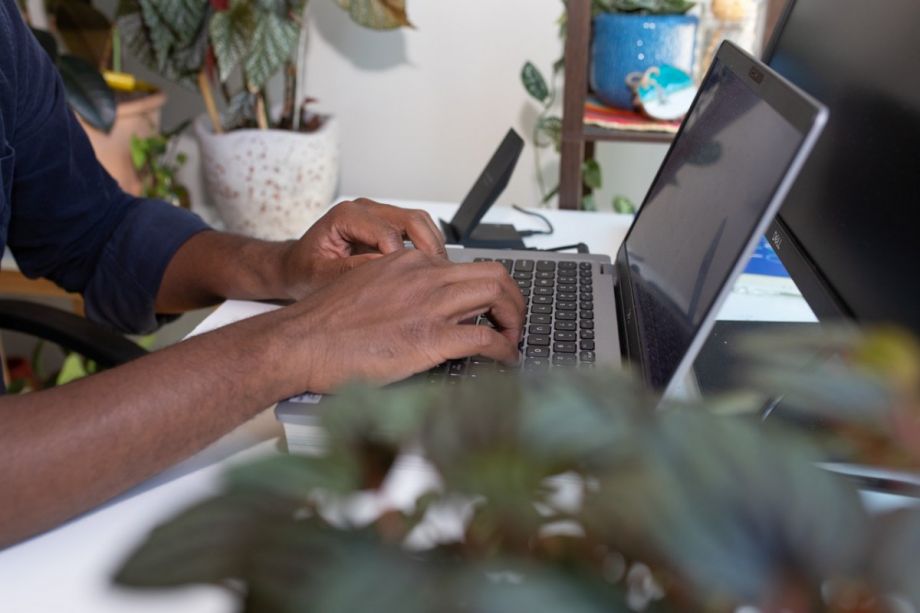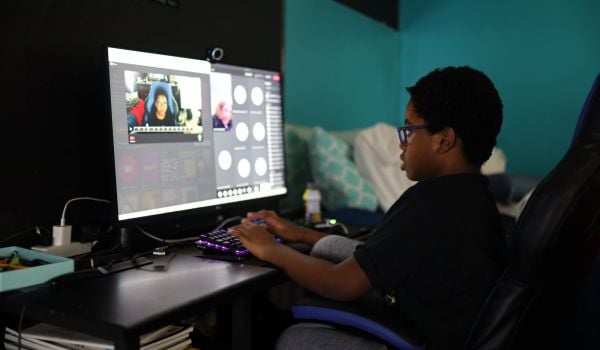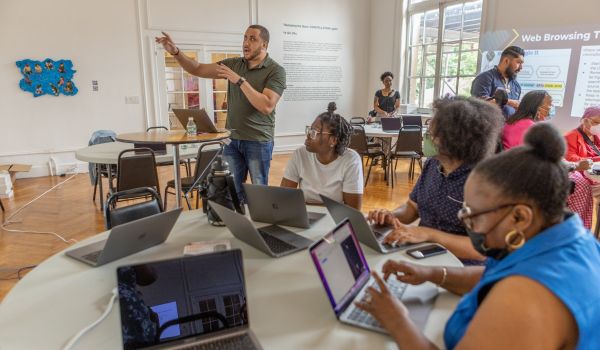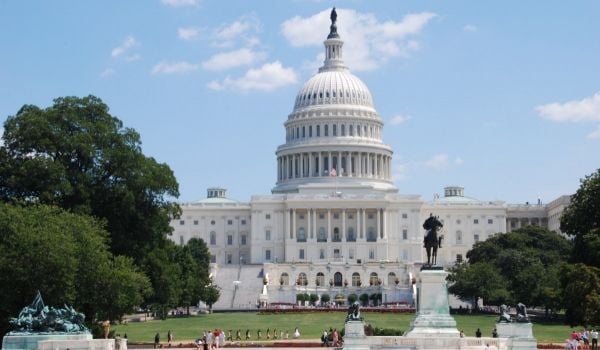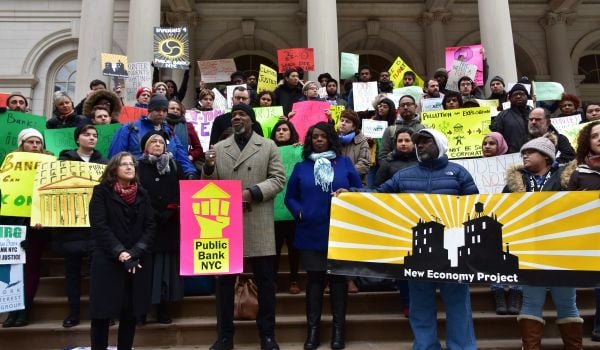In late October, New York City announced it would invest $157 million over the next 36 months to build publicly-owned, open-access broadband infrastructure. The goal is to ensure 1.6 million New Yorkers have access to affordable internet service.
The announcement builds off the city’s Internet Master Plan, the first effort of any large U.S. city to strategize delivery of equitable internet access to all its residents. The plan has already made progress in delivering affordable internet access to its public housing residents. And it’s proving that smaller, community-based internet providers are powerful partners in doing so.
“The goal was not just to connect NYCHA residents quickly, but to change the ISP [internet service provider] market for the long term,” Aaron Meyerson, the city’s Deputy Chief Technology Officer - Broadband, told Next City in an email. “This was necessary because, for decades, internet infrastructure was simply not built in lower income neighborhoods.”
The city released its Internet Master Plan in January of 2020 to address a stark digital divide that would soon be laid bare by the pandemic: Nearly a third of households didn’t have a broadband internet connection at home and over 1.5 million New Yorkers have neither a mobile connection or home broadband connection. The plan outlined a variety of public/private partnerships that could gradually build out universal broadband access.
For the first phase of implementation, the Mayor’s Office of the Chief Technology Officer partnered with the New York City Housing Authority (NYCHA) and NYC Economic Development Corporation to solicit ideas to bring affordable broadband to NYCHA residents. That was followed by a larger request for proposals, released this spring, to bring affordable broadband to 69 neighborhoods identified by the city’s Task Force on Racial Inclusion and Equity, which include over 200,000 NYCHA residents.
Between June 2020 and July 2021, the city brought on six vendors to begin installing low-cost internet connectivity options at NYCHA buildings. Those vendors are on track to service 40,000 residents in 18 developments by the end of the year, according to the Mayor’s Office of the Chief Technology Officer.
The work represents a growing priority to integrate affordable broadband with public housing and low-income communities of color, according to Danny Fuchs, a managing partner with HR&A Advisors who helped design the Internet Master Plan. This March, Next City reported that the New York City Department of Housing Preservation and Development adopted guidelines saying that all new affordable housing using city funds must provide high-speed internet at no cost to tenants. Across New York State, HR&A is working with the New York State Association for Affordable Housing to develop an “affordable housing broadband initiative,” Fuchs says.
In New York City, the Internet Master Plan has provided a “more level playing field” for smaller providers, Fuchs points out, and those providers have begun building new models of inclusive, accessible broadband for affordable housing residents.
NYC Mesh is a volunteer collective that’s been building out an open community wi-fi network across the city since 2012. BlocPower is a Brooklyn-based green energy provider that takes a community-based and environmental justice approach. (The company also helped found People’s Choice, a cooperative ISP formed by workers who striked against Spectrum.) Both were selected by the city to begin the NYCHA installations.
This spring, NYC Mesh finalized installation of free community wi-fi in the courtyard of NYCHA’s 303 Vernon Avenue in Brooklyn. “This was a sort of test balloon and it’s been running really well,” says NYC Mesh install leader Rob Johnson. Through this fall, the courtyard received between 500 and 1,000 device connections — “I would say more people than average are connected compared to our other public wi-fi spots.”
NYC Mesh is gearing up for a second installation in the South Bronx — located on the development’s roof to provide access inside tenants’ apartments and the surrounding community. They also hope to install a similar service at 303 Vernon in order to increase access beyond the building’s courtyard.
“We’ve been making the case for a while that the type of service we build is uniquely beneficial to public housing the way it was constructed in New York — these tall buildings amidst fairly short buildings,” Johnson says. Such tall buildings are ideal for NYC Mesh to install “nodes,” wireless routers mounted on rooftops and balconies, which connect to other nodes to form a larger community wi-fi network.
BlocPower is installing broadband access at three NYCHA developments in the Bronx, which residents can use in shared spaces and inside their apartment. “We’re finalizing our installation at Melrose Houses, where thousands of residents will have a low-cost alternative to access to the internet,” says Keith Kinch, BlocPower’s general manager. The next two developments will be outfitted by early next year.
Both organizations hope this early work translates to a deeper relationship with NYCHA tenants — including job pipelines. “We have residents of Melrose installing wi-fi in Melrose,” Kinch says of BlocPower. “We’ll have another 100 people working through the winter and we’re excited to hire folks who live in the neighborhood and the buildings.” As NYC Mesh works to expand from a small, volunteer nonprofit, it hopes to recruit and hire NYCHA residents to become part of the growing organization.
Even though the early groundwork of the NYC Master Plan has been laid, advocates like NYC Mesh’s Johnson think it could be doing more at a faster pace. “For the amount of effort put in, and the amount of money on the table, it hasn’t got that many people connected,” he points out. NYC Mesh’s vision also goes far beyond affordable wi-fi networks for individual buildings: “We would like to see the internet transformed into a commons resource or public good, kind of like street lights where nobody pays for the individual street lights but we all benefit from them.”
Johnson is still glad the city has a “guiding framework” to move the work forward. This latest investment of $157 million will bring affordable connectivity options to an additional 70,000 NYCHA residents and 150,000 residents in the surrounding communities by early 2022.
The work is likely to ramp up across the state, and the country, with $65 billion of broadband funding designated in the federal government’s infrastructure bill. “New York City is proving that broadband deployment is enabling the creation of new social infrastructure and the empowerment of existing social infrastructure,” Fuchs says, “To wind up creating new economies at the neighborhood scale.”

Emily Nonko is a social justice and solutions-oriented reporter based in Brooklyn, New York. She covers a range of topics for Next City, including arts and culture, housing, movement building and transit.
Follow Emily .(JavaScript must be enabled to view this email address)

